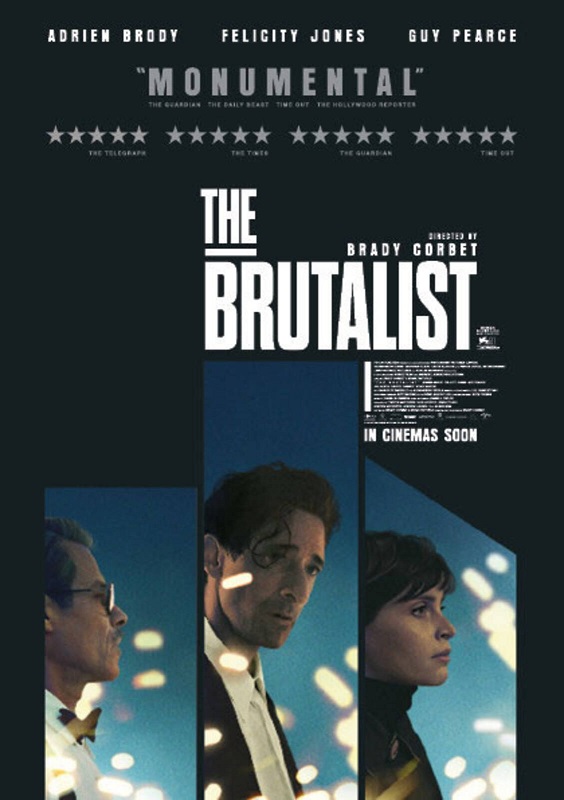

2024 – The Brutalist
Wow. This movie was about three and a half hours long, and there was no need for it. This movie was pretentious and self-important, again, for no reason. The pacing was slow and drawn out. And while they did not take long, there was an overture and an intermission screen. I’m no editor, but it seems to me that they could have taken the run time down to about two hours, and still had a good movie
Because, to be sure, this was a good movie. It was well-constructed and well-filmed. The acting was top-notch and the 1940s send 50s time period was respected. But there were just so many scenes that went on too long. At first, I thought the score was strange, but after a while, I got used to it, and it fit. It was a lot of enigmatic soundscapes with dissonant pizzicato flourishes in the background, but it ended up working with how weird the movie became, in the end.
My first impression what that there wasn’t much story in the narrative. But the more I think about it, the more I understand that there really was a lot that happened, and it seems to fall in line with other films that have been nominated for Best Picture. It was about human struggle and the human capacity for cruelty. The subplots that took place around the lead character all had an effect on his journey in good and bad ways, and although he wasn’t perfect, he was a good man, a likable man, a passionate man.
This is the story of an educated immigrant, Laszlo Toth, impressively played by Adrian Brody. Before WWII, he was a successful architect. But as a Holocaust survivor in America, he was nobody. He tried to work for his cousin, Atilla, played by Alessandro Nivola, but the relationship turned sour when crazy Atilla accused him of ruining his furniture business and making a pass at his wife, two accusations that were completely unfounded. After this, be becomes a homeless heroin addict.
The rest of the film follows his struggle to establish himself as an architect in Pennsylvania, with the help of a wealthy businessman as a patron. That man is Harrison Van Buren, played by Guy Pearce. He gives Laszlo a place to live and an architectural project to keep him employed. He also uses his connections to bring Laszlo’s wife Erzebet, beautifully played by Felicity Jones, and his emotionally traumatized niece Zsofia, played by Raffey Cassidy, out of Europe into America.
I think one of the problems with the narrative is that there wasn’t conflict in the movie until the very end. The worst that happened was that Harrison brought on an inferior architect to bring the costs of Laszlo’s project down, damaging his creative vision, and Laszlo became angry. Then, there was a terrible accident while transporting building materials that derailed the project until insurance claims could be settled. After two years, Laszlo is brought back in to continue the work.
But then the movie turned weird. While on a trip to a marble quarry in Italy, Harrison finds Laszlo high on heroin, and straight up anally rapes him, revealing that he has been physically attracted to him all along. What the…? It was from out of left field! Erzbet angrily confronts Harrison at a business dinner party and calls him a rapist in front of his guests. Harrison runs away into the night, never to be seen again. Laszlo and his wife return to Europe, and years later Laszlo is celebrated as a master architect who is being honored at a fancy gala.
Now, all that being said, the acting was incredibly good. Brody and Pierce both stood out as exceptional, and I can understand why Brody took home the Oscar for Best Actor. He totally deserved it. Hi was able to maintain his accent perfectly from the beginning of the movie to the end, which is always impressive when it is done well. And there were several scenes where he had to break down into tears and sobbing, something we knew he was capable of after seeing him in The Pianist in 2002. And I have to give special props to Joe Alwyn who played Harrison’s smarmy son, Harry Van Buren. He was so easy to hate.
I also loved Felicity Jones as Erzebet. There was a subplot which involved her health problems, as she was dealing with osteoporosis. While she is having an episode of extreme pain, Laszlo soothes her pain with heroin, almost killing her.
But what I liked about her character was the intelligence and charm she displayed in social situations, and the fact that she clearly loved Laszlo. She was perfect.
This movies was good, but I think it might have been better if they had just cut about an hour and a half out of its bloated run-time. I think I can see why this was nominated for a best picture. There were a few scenes with some intense drama, and the actors didn’t shy away from it. It really was a pretty good movie, just not as good as it thinks it was. Like I said, if felt just a little too self-important. And before I forget, I have to mention the credits that were done in a way that seemed to somehow reflect artistic architecture. The opening credits scrolled across the screen horizontally. The ending credits scrolled diagonally. It was a simple little interesting touch that I found effective for the story that was told.








